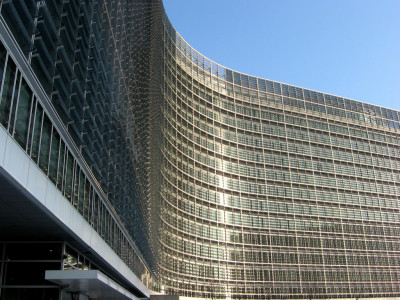Skinning Cobras and Climbing Trees in Belgium
Trying to save energy in Europe and around the Mediterranean
Brussels is at least two cities in one: a modern European municipality rich in history and containing some spectacular gilded palaces, and a capital city. It is the seat of government for Belgium – a flag flies over the palace when the king is nearby – and the capital for the European Union. The governing side of things is represented by massive (almost scary) office complexes — everywhere. The local courthouse is a palace with a dome 340 feet high, and the complex covers six acres. Look for the European Commission, and you will find it on almost every street corner, sometimes in an x-shaped structure covering multiple football fields.
I spent two days this week in Brussels meeting with officials of the European Investment Bank, the European Commission and the Union for the Mediterranean and hearing from various European ministers – first at a jointly-sponsored energy efficiency conference, and then in a working session with the energy efficiency policy team at the European Commission. The take-away: there is a strong commitment to aggressive efficiency policy throughout the region, but these things take time.
 At the conference, Francesca Starace (the CEO of Enel Greenpower) declared that the Mediterranean is becoming less efficient while the rest of the world is becoming more efficient. The reason? Subsidies for fossil fuel. For example, Francois Moisan, the President of an association of national energy conservation agencies (MEDENER) said that Tunisia devotes 15% of its budget to fossil fuel subsidies. Assar Saidi, who chairs the Clean Energy Council in the United Arab Emirates, said that the eight percent of the Gross Domestic Product in the Arab world goes to oil subsidies. Over 60% of the Arab population is under age 25, he says, but there is more money spent on these subsidies than on education. Said Mouline, Executive Director of Morocco’s energy development agency, debunked the notion that energy efficiency options resemble low-hanging fruit. There is no low hanging fruit, he says, due to these subsidies and because of the challenge of financing upfront efficiency investments. Instead, policy makers need to learn how to climb trees.
At the conference, Francesca Starace (the CEO of Enel Greenpower) declared that the Mediterranean is becoming less efficient while the rest of the world is becoming more efficient. The reason? Subsidies for fossil fuel. For example, Francois Moisan, the President of an association of national energy conservation agencies (MEDENER) said that Tunisia devotes 15% of its budget to fossil fuel subsidies. Assar Saidi, who chairs the Clean Energy Council in the United Arab Emirates, said that the eight percent of the Gross Domestic Product in the Arab world goes to oil subsidies. Over 60% of the Arab population is under age 25, he says, but there is more money spent on these subsidies than on education. Said Mouline, Executive Director of Morocco’s energy development agency, debunked the notion that energy efficiency options resemble low-hanging fruit. There is no low hanging fruit, he says, due to these subsidies and because of the challenge of financing upfront efficiency investments. Instead, policy makers need to learn how to climb trees.
Hammering further on the danger of subsidies, Palestinian Energy and Natural Resource Minister Omar Kettanah invoked the fable of the Indian cobras. As the story goes, the government in India once offered a bounty for the delivery of cobra skins in the hope of reducing cobra populations. Enterprising citizens responded by breeding more cobras in order to have more skins to sell. When the government ended the bounty out of frustration, the breeders dumped their snakes on the streets. The result: a subsidy to reduce the snake population had the opposite effect. I am not sure how to apply that to energy efficiency programs, except to remember the importance of being careful what you ask for.

Meanwhile, in terms of overseeing the development of energy efficiency programs in each of the EU’s 28 member states, the expert staff of the European Commission has its work cut out for it. The Commission’s approach is to mandate efficiency programs, offer directives about expected results, but then provide tremendous latitude to the individual members related to implementation. Perhaps the working relationship is most like the cooperative federalism underlying the U.S. Clean Air Act, but with a lighter touch coming from the central governing body. The result is that the staff tries to monitor progress in the various countries without getting in the way. Of course, language and cultural differences, as well as staffing limitations, add to the challenge. There is a formal system of filings, notices and warnings and the ability on the part of the Commission to impose penalties for failure to comply. However, the staff is aware that not all nations come equipped with the same resources, the same ability to staff-up, or the same needs in terms of efficiency improvements. As a result, the regulators exercise patience and courtesy, and try to help where they can. It all takes time.
Although many of those I talked to consider energy efficiency to be the unsexy cousin of renewable energy, there is, in Europe, political tolerance for efficiency mandates coming from the central government. Why is that the case, while the federal government in the United States has been unable to insist that the individual states do much of anything in this arena? The result in the U.S. is that when it comes to utility ratepayer-funded energy efficiency programs, 10 states in the U.S. spend 70% of the money, and many states spend little or nothing. Why is Europe more unified on this topic?
Posing this question to various people resulted in several possible explanations: First, the price of conventional energy in most of Europe is much higher than it is in the U.S. Second, most European nations are not energy self-sufficient. Third, dependence on Russian natural gas has raised many concerns about economic and national security. Fourth, the culture in Europe is that cost-effective efficiency improvements offer a no-regret option. None of these conditions loom as large in the U.S. But perhaps most significant was the final point that people made: In Europe, conservative leaders were in front of the parade. They understood the challenge and were willing to endorse a plan to reduce energy use. In recent years, it seems that environmental and energy efficiency stakeholders in the U.S. have rallied liberal supporters and criticized reticent conservatives. It is easier to say than to do, but enabling conservatives to take ownership of energy policy reform might improve the odds of a successful result in Congress.






Reader Comments